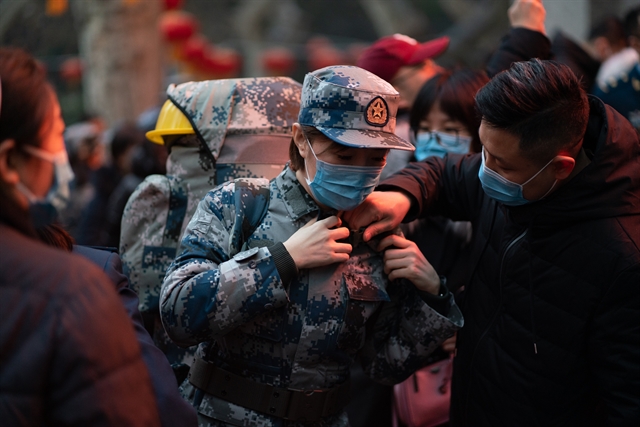 World
World


|
| A medical staff from Air Force Medical University prepares for leaving for Wuhan in Xi'an, capital of northwest China's Shaanxi Province, on Friday. A group of medical staff of Air Force Medical University left for Wuhan, the center of the novel coronavirus (2019-nCoV) outbreak, to provide medical aid. — XINHUA/VNA Photo |
WUHAN — China on Sunday expanded drastic travel restrictions to contain a viral contagion that has killed 56 people and infected nearly 2,000, as the United States and France prepared to evacuate their citizens from a quarantined city at the outbreak's epicentre.
China has locked down the hard-hit province of Hubei in the country's centre and the capital Wuhan in an unprecedented operation affecting tens of millions of people to slow the spread of a respiratory illness that President Xi Jinping said posed a "grave" threat.
The virus has spread throughout China and around the world, with cases confirmed in around a dozen other countries as distant as France, Australia and the United States.
The State Department said on Sunday it was arranging a flight to evacuate staff at its consulate in Wuhan as well as other American citizens trapped in the city.
The flight departs Wuhan on Tuesday for San Francisco, it said in an email to Americans in China, while warning of "extremely limited" capacity for private citizens.
France's government and the French carmaker PSA – which has a sizable presence in Wuhan – also said they were formulating plans to evacuate staff and relatives, who would be taken to a city in a neighbouring province to face a quarantine period.
Sri Lanka said its embassy in Beijing also was considering action regarding its own nationals.
Travel bans
The streets of stricken Wuhan were even more deserted on Sunday after new restrictions went into effect banning most cars from roads in the metropolis of 11 million.
A woman said she and fellow staff at a Wuhan hotel were living in the hotel itself as a precaution amid the transport freeze.
"The hotel is letting us live in it for our safety because if we go out we are afraid of being infected," said the woman, who declined to give her name.
But residents interviewed by AFP generally took the hardship in stride. "I have a lot of confidence. I believe the Wuhan city government can defeat this (epidemic)," said a man who gave only his surname, Wan.
Travel is also being curtailed in other parts of the country, with long-distance bus services entering and leaving Beijing suspended Sunday. The neighbouring northern city of Tianjin plans to follow suit on Monday.
The southern city of Shantou announced a partial lockdown on Sunday, restricting the entry of cars and suspending public transport, while passengers arriving in the city by train will be screened and "urged to return", authorities said.
Overseas Chinese tour groups will be suspended from Monday while domestic trips have already been halted since Friday.
In the semi-autonomous southern city of Hong Kong, Disneyland announced on Sunday it had closed following the government's declaration of an emergency to combat the crisis.
The nationwide death toll rose to 56 after 15 new deaths, most of them in Hubei.
The financial hub of Shanghai, which has extensive international air connections, on Sunday reported its first death – an 88-year-old man who had pre-existing health problems.
It was the first death reported in a major city outside of Wuhan, where the outbreak is currently believed to have originated in a seafood and live animal market.
The government has said most fatalities were people already weakened by pre-existing health conditions.
Fearing a repeat of the deadly 2002-03 SARS epidemic, China has dramatically scaled back celebrations and travel associated with the week-long Lunar New Year holiday that began on Friday to prevent large gatherings of people.
Xi said at a Communist Party leadership meeting on the situation that China was "faced with the grave situation of an accelerating spread" of the virus, calling for stepped-up prevention efforts.
China's National Health Commission has ordered nationwide measures to detect and isolate people carrying the virus on planes, trains and buses across the country.
Pop-up hospital
China's military has dispatched 450 medics, many with experience combating infectious diseases, to help treat patients in Wuhan, where hospitals are overwhelmed and supplies like goggles and masks running low.
At a time when people should have been celebrating the holiday, many in Wuhan have endured long and anxious waits are crowed hospitals.
"It takes at least five hours to see a doctor," one woman, who didn't want to be named, said.
A man in his 30s said some people had queued for two days. Many people brought their own chairs.
Wuhan is racing to build two makeshift virus-focused field hospitals within a fortnight to ease the pressure. The first could be ready in just over a week.
The crisis has seen public attractions such as Beijing's Forbidden City, a section of the Great Wall, and the Shanghai and Hong Kong Disneyland parks close as a precaution. — AFP




